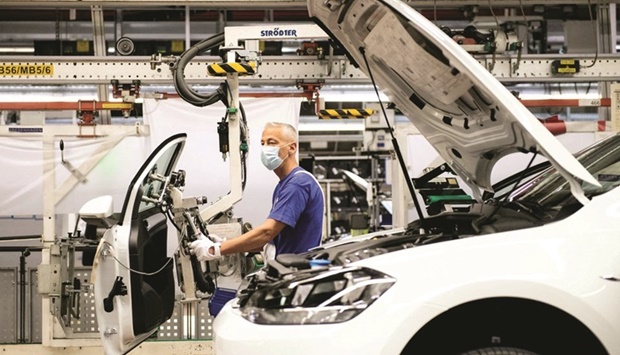Long one of the globe’s economic stars, Germany is on a brink of a reversal of fortune which some fear imperils the prosperity built by its post-war generation.
While on the surface, the German economic engine is purring, a recent reversal in exports and steep stock price falls betray deep-seated problems in the continent’s most populous and industrious country, a central pillar of the European Union.
In May, Europe’s biggest economy imported more than it exported for the first time in three decades, breaking a winning streak as “Exportweltmeister” or “global export champion” since the country’s reunification.
Finance minister Christian Lindner compared it with a “profit warning” — a red alert companies issue if earnings are set to disappoint. Selling more than it buys has been a central tenet of Germany’s ascent to the global economic elite. Just weeks earlier, on the same day as Berlin edged towards rationing energy, shares in Deutsche Bank and Commerzbank, the country’s flagship lenders and bellwethers for its economy, tumbled around 12%.
German regulators put that collapse down to fears for the country’s economy in the face of curbs in the supply of Russian gas that underpins industry, said one person with knowledge of the matter.
“This may really be the beginning of a weaker period for Germany,” said Achim Truger, one of the government’s chief economic experts that advises the chancellery.
“If ever somebody viewed Germany as a role model, maybe it’s time to have a realistic view about strengths and weakness. Nobody’s perfect.”
After the World War Two, Germany, bolstered by US aid, built its economy on cars, machinery and chemicals, controlled through banks such as Deutsche Bank owning stakes in industrial firms — a system known as Deutschland AG, or Germany Inc.
The country’s Bundesbank held its currency steady, cheap Russian gas powered industry and unions were tied into management boards to control wages. The result: an icon of industrialism grudgingly admired around the globe.
All this fuelled leaps in exports through the 1980s, 1990s and 2000s, by which time the Deutsche mark had been replaced by the euro at a rate which made German exports attractive.
Germany, thanks to labour market reforms, overcame a spell as the “sick man of Europe” at the turn of the millennium, but its success in selling more to its European neighbours than it bought, antagonised many countries that borrowed to buy German goods.
Then Berlin’s insistence in the debt crisis that countries such as Greece accept tough conditions for emergency loans fuelled more resentment. But many Germans rejected such criticism, crediting their efficiency for the nation’s success.
Seeking to rekindle the collaborative spirit that led to this success, German Chancellor Olaf Scholz this week met trade union and employer association leaders to discuss what he called a “historic” cost of living crisis.
Scholz, a Social Democrat, said he was reviving a model of cooperation established in 1967 when Germany fell into recession for the first time since its post-war boom.
But it will be harder now to placate trade unions, following a national drive to keep wages low through tax-free “mini-jobs” that capped hourly earnings for many low-skilled workers at about €10 — just enough to buy 20 McDonald’s chicken McNuggets.
Reforms to curb unemployment payouts, introduced by Social Democrat chancellor Gerhard Schroeder, who forged close ties with Russian president Vladimir Putin and later worked for a Russian oil giant, further soured relations with unions.
Although Germany appears more stable than Britain, which is facing government upheaval, or France, where people clad in yellow vests protested against soaring costs of living, tensions are simmering.
Growing worker discontent can be seen in the rise of strikes. Those peaked recently in 2015, with roughly 28 strike days per 1,000 workers compared with almost none in 2000, and more recently, unions have warned of more strikes to push for wage hikes.
“I saw this risk ... when there was discussion of a gas embargo,” said Monika Schnitzer, another economic adviser to the government. “I would be seriously worried about stability.”
Economists now believe that Germany could be opening a bleak chapter.
Although it held up better than the euro area as a whole during the pandemic in 2020, its economy did not rebound as strongly as the bloc in 2021 and is expected to lag this year.
The European Commission forecasts Germany to grow 1.6% this year compared with 3.1% for France and 4% of Spain.
“Globalisation, just-in-time supply chains and cheap energy from Russia — those are things that are changing and they are changing for good,” said Carsten Brzeski, an economist with Dutch bank ING.
Those advantages have helped make German industry, from giants to hundreds of medium-sized champions, so successful.
“This is a real turning point for Germany,” he said.
Germany’s critical engineering and machinery sector, which outfits factories throughout China and the world, is on edge.
Ralph Wiechers, executive board member at the industry’s VDMA trade body described the trade balance swinging into the red as a “warning”.
“The question now is to what extent customers worldwide will scale back projects,” he said.
Fielmann, the German eyewear manufacturer that operates in 16 countries, is pessimistic. Its shares have tumbled a third this year.
“We are feeling the considerable increase in transport and energy costs and the pressure in the supply chains,” said its chief executive Marc Fielmann.
Gunther Schnabl, an economist with Leipzig University, blames German penny pinching for the country’s predicament.
For years, Germany has saved money on defence and infrastructure while helping exporters by keeping wages low and importing cheap gas from Russia, he said.
“But it wasn’t investing the money. Instead it was using it to hide an erosion of prosperity. This isn’t going to work for much longer. Divisions and dissatisfaction are growing.”

A worker at the Volkswagen assembly line in Wolfsburg, Germany. (Reuters file photo)
